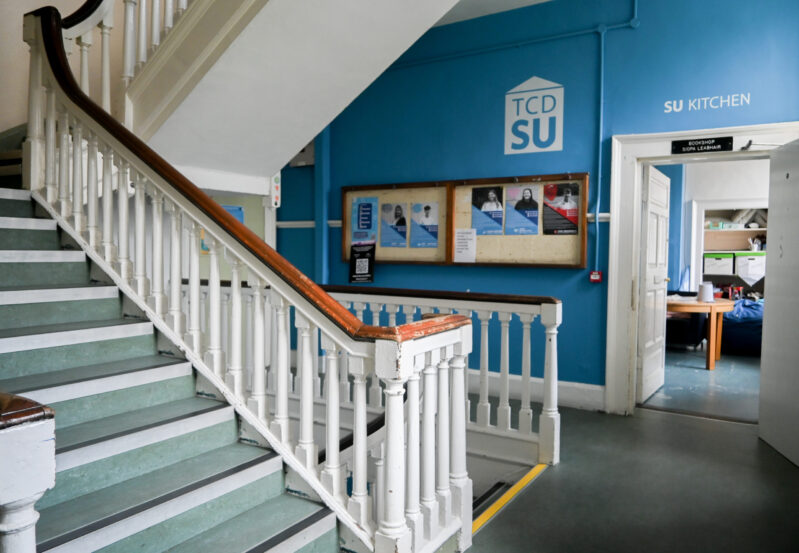The Hist held a debate on the renaming of the formerly known as the Berkeley Library with ten speakers each arguing for their own proposed name. The debate featured five students, Ben Kieran Glennon, Malika Maniar, Brian Lennon, Clare Tobin, and Méabh Scahill. The students were joined by five additional guests; Micheline Sheehy Skeffington, Professor James Smyth, Mary McAuliffe, Brian Lennon, and Reverend Gordon Linney.
The renaming of the former Berkeley Library comes after Trinity’s Board decided in April of 2023 to dename the library as its namesake George Berkeley held a sordid history of slave-ownership. The Trinity Legacies Review Working Group will be advising Trinity’s Provost on a new name for the library. This debate came with a disclaimer that the new name would not be decided that night, but the debate was instead a forum for public opinion to be voiced preceding the official renaming.
Alternating between students and guest speakers, Brian Lennon began the debate in favour of the name Oscar Wilde, after the prolific Irish poet and playwright and former Trinity student. Lennon, a third year Classics student and Scholar, encouraged the audience gathered in the Exam Hall to “take a walk on the Wilde side”, describing Wilde’s time at Trinity College Dublin as both “formative” and “foreboding”. Lennon argued that Wilde was a champion of both youth and love and should be honoured as such.
Professor James Smyth then took to the stage to debate for the name Theobald Wolfe Tone. Tone, who was a leading figure in the Irish’s fight for independence from Britain, additionally founded the United Irishmen. Smyth argued that inclusivity includes both racial and gender identities as well that of religious inclusivity. He stated that though all the distinguished figures proposed tonight represented a tradition to be “acknowledged, cherished, and honored”, he was “pretty sure they would cast a vote” in favor of Tone. Tone was Auditor of the Hist in 1787 and also won all three of the Hist’s medals.
In a change of pace, Malika Maniar, senior sophister in History and Politics and current treasurer of the Hist, proposed the name 1904. 1904, Maniar explained, was the first year that women were allowed to study at Trinity. A school with now over 60 per cent of female students, Maniar argued that the former Berkely library is one of the most public and central places on campus and as such a hub, it is important to ask what we want to value and put forward when renaming it. Maniar spoke about former provost of Trinity, George Salmon, who famously said “over my dead body will women enter this college”, a man whose statue is a consistent figure in the graduation photos of many a female Trinity student. Maniar argued that though Salmon was one person, he was part of a wider idea and feeling and that here at Trinity, the conversation is about how far women have come against him rather than celebrating the actual achievement. 1904, she argued, represents the first step forward to where we are today. As it’s impossible to honour all women, Maniar argued “by representing none, you represent them all”.
Architect Róisín Murphy then spoke in favour of the name Paul Koralek, the architect who designed the library. Murphy, an architect herself, spoke first of the importance of the association between buildings and power, particularly in relation to the British and their colonization of Ireland. She then explained the story of Koralek, who was 28 when he built the library after winning a competition. This story, she said, was beloved by Irish architects, calling the building their “pet brutalist building”. Murphy argued that Koralek’s youth is “evident all over the building”, saying he put everything into it, with “bubbling youthful enthusiasm”. She praised his work as “unrestrained” in a youthful manner and argued that the design captures“excess ambition with no cynicism”. She ended her speech by stating that the college choosing this name would represent them making investment and putting their faith into young people.
The name Saoirse, the Irish word for freedom, was then debated for by Ben Kieran Glennon, a first year student studying Law and Politics. Kieran Glennon acknowledged the merits of the other speaker’s proposed names but argued that the idea of naming a building after a singular individual perpetuates the idea that history and change is made by singular people. He stated that it is ordinary people who together make change, this being especially true in academia. Continuing to acknowledge the achievements of the proposed individuals, Kieran Glennon argued that they all share one common thread – the search for freedom. He also made an argument that the name Saoirse returns to the reason the library is being renamed in the first place. He stated that he was initially against the idea of renaming the library as he didn’t think Trinity should be able to hide from the fact it had honored a slave owner. Saoirse, however, acknowledges this, striking a balance between accountability and moving forward. He also expressed the importance of the name of the library being in Irish, saying that Gaelic has long been repressed and it’s time for a name that honours Irish history.
Micheline Sheehy Skeffington then proposed her father, Owen Sheehy Skeffington. Her father both studied and taught at Trinity and served as a Hist committee member and was a Irish senate member. He is praised as a champion of women and minority rights, civil liberties, and freedom of speech among others. Sheey Skeffington described her father as fearless for speaking out on what he believed to be the truth, with unwavering compassion for even his opponents. She argued that his lifetime of fighting injustice and advocating against force makes him an icon of independent thought and an example of the usage of debate to create change in society.
Final year History student and Editor of the Trinity Journal of Histories Clare Tobin then gave her speech in favor of naming the library after African Philosopher Anton Wilhelm Amo. Tobin explained that though Amo was not Irish and had no connection with Trinity, his story has everything to do with why we are renaming the library saying it is a great opportunity to demonstrate global outlook. As the only person of color proposed, Tobin argued, naming it after Amo honors the period of contemplation since denaming the library. Amo, who was only 18 years younger than Berkeley, believed in and defended human equality. Tobin argued that the fact Berkely and Amo were contemporaries, highlights that right and wrong has not changed throughout history and that change and revision are welcomed additions to the story of history.
Jonathan Swift was then proposed by Reverend Gordon Linney. Linney began his speech by stating that he felt the renaming was synonymous with “driving a car only looking in the rearview mirror”. Linney had brought a prop with him, a pair of Calvin Klein underwear. He explained to a bemused audience that the underwear had been made in Bangladesh. This, he argued, proved that slavery was not a thing of the past, meaning that the premise of the debate about Berkeley is “false” and that the notion that slavery has been left behind is “ridiculous”. Despite this, Linney did have a proposal for the rename, honoring famed Irish author and satirist, Jonathan Swift. Linney described Swift as a “pain in the butt for the English establishment” and argued that Swift’s works of both letters and satire were instrumental in working to prevent the English from exploiting the Irish as well as exposing the exploitation of poor Catholic families. He also added that Swift’s commitment to mental health in the form of his donation to St Patrick’s Hospital deems him worthy of the honor of having more than just a lecture hall named after him. He ended his speech, however, by urging the audience to not “fall for temptations of believing slavery is gone and finished”.
The last student speaker, Méabh Scahill, a third year History and Art History student and Scholar, proposed the library be renamed in honor of Irish poet and author, Eavan Boland. Schaill argued that Boland had “carved out space for women ” in poetry and that her work makes her uniquely suited for the honour through its interactions with colonialism, racism, and misogyny, all of which is a “legacy we fail to engage with”. She argued that this is an opportunity to celebrate Boland, highlighting her to staff, students, and visitors who may not have been exposed to her before. She finished by stating that in doing so, Trinity creates distance from Berkeley in a way that isn’t performative and is insead authentic and in agreement with the thesis of the Legacies Working Group.
To end the debate, UCD academic of History and Gender Studies, Mary McAuliffe then proposed the name Maxwell-Otway-Ruthven, a slight modification of her originally proposed name of Maxwell. McAuliffe explained and argued for her choice, maintaining the academic achievements of both Constantia Maxwell and Annette Jocelyn Otway-Ruthven qualified them for the honour of the library. Maxwell was the first woman to become a professor at Trinity and was appointed to the Lecky Chair. Otway-Ruthven was taught by Maxwell and would end up succeeding her as Lecky Chair. McAuliffe argued for these women to be honoured due to their immense contributions to Trinity and to women in the field of history.
The debate, which in total lasted about two hours, was a showcase of the talent and intellect held by Trinity students and their guests as well serving as an inspiring moment of reclamation for a public space so tainted by the despicable history of the man it was once named for.







